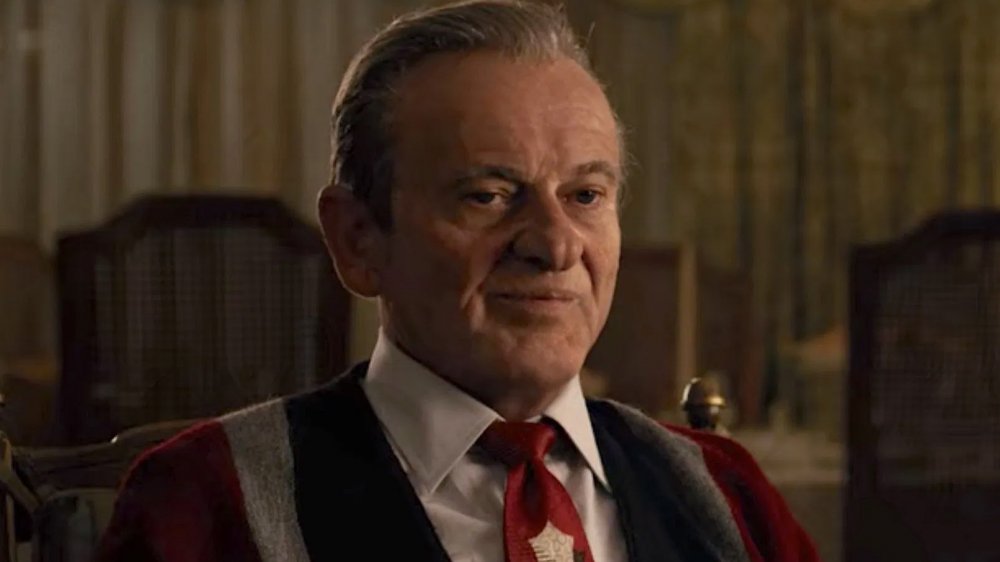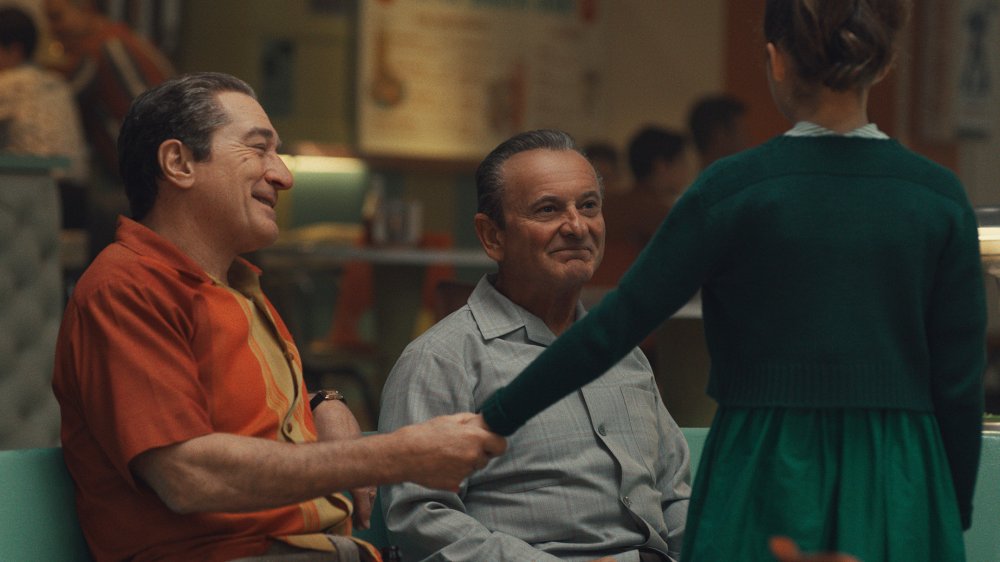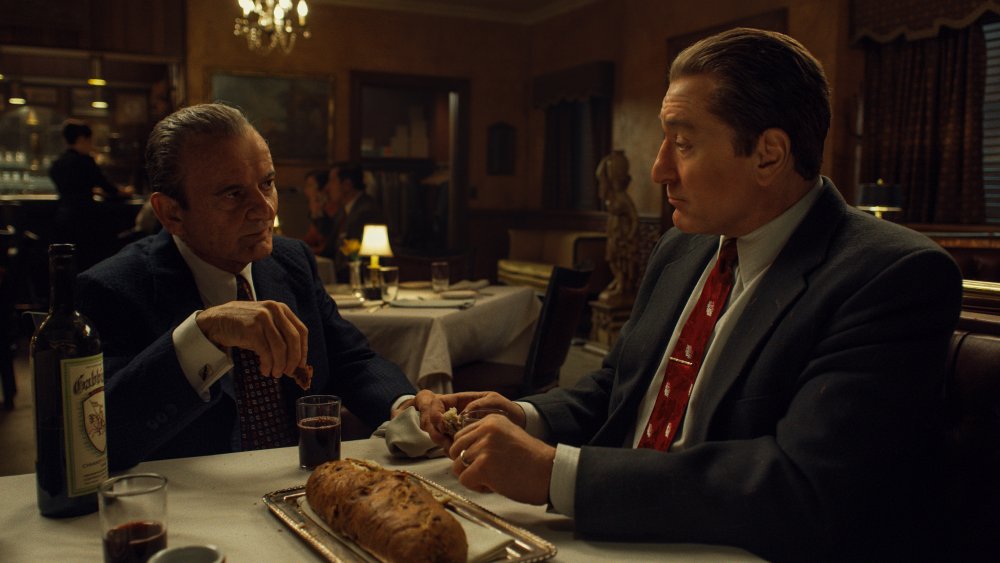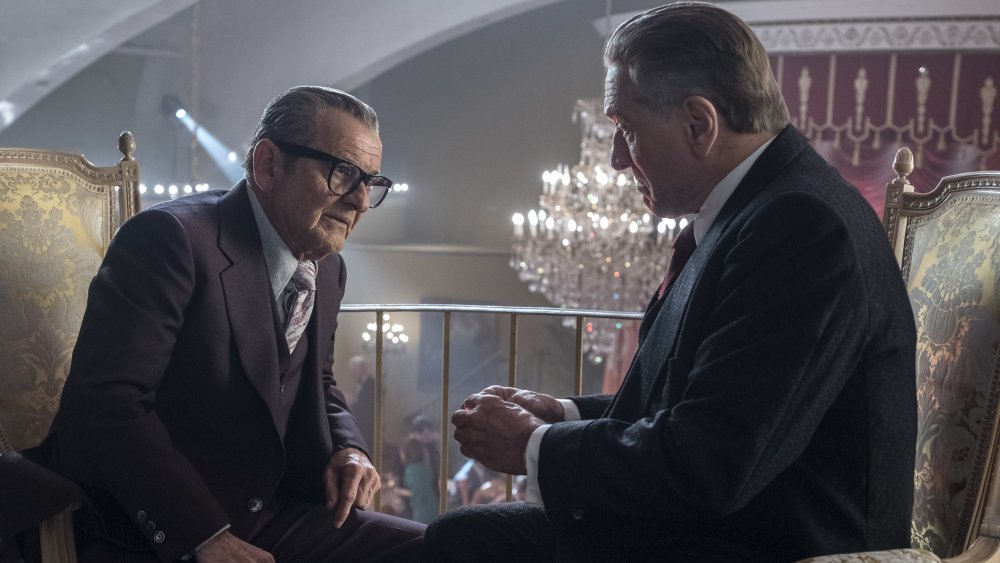The One Irishman Scene That Makes Us Love Joe Pesci Even More
This content was paid for by Netflix and created by Looper.
At its heart, Martin Scorsese's The Irishman is a battle for the heart and soul of one man, mob hitman Frank Sheeran. On one side, there's Frank's best friend, notorious Teamsters president Jimmy Hoffa. On the other, there's Frank's mentor, mob boss Russell Bufalino, who introduced Sheeran to the world of organized crime. As the decades pass, both Hoffa and Bufalino test Sheeran's loyalty, even as the tenuous relationship between the union chief falls apart. A few years after Hoffa gets out of prison on jury-tampering charges, Hoffa's increasingly erratic and self-serving behavior threatens to upend the entire operation. Something needs to be done.
The whole thing comes to a head during a ceremony celebrating Sheeran's commitment to the Teamsters. On what should've been a joyous occasion for Frank, Bufalino pulls him aside to deliver an urgent message. First, he gives Sheeran a special ring, commemorating the relationship between the two. Next, Bufalino gives Sheeran an ominous warning: If Sheeran doesn't get Hoffa to back down, the mob is going to have to take more drastic measures.
It's a fantastic scene between Robert De Niro, who plays Sheeran, and Joe Pesci, who plays Bufalino, but that's not shocking. The Irishman is De Niro and Pesci's seventh collaboration. At this point, they know each other very, very well. And yet, this short, subtle conversation doesn't just mark one of Pesci's best moments in the movie — it's a wonderful testament to his abilities as an actor in general, and the perfect capstone to his five-decade career. Here's how.
It's how his long-running friendship informs the scene
Without Robert De Niro, we wouldn't have Joe Pesci, at least not as we know him today. Before 1980, when Pesci made his Oscar-nominated appearance in Scorsese's Raging Bull, he was virtually unknown. Sure, Pesci had been working in show business for a while. In 1968, he released his first album, Little Joe Sure Can Sing! He worked as half of the comedy duo "Vincent and Pesci" throughout the early '70s.
Still, before Raging Bull, Pesci only had one film credit to his name — The Death Collector, a low-budget mob thriller — and that came out in 1976. For the following four years? Nothing. However, Robert De Niro saw The Death Collector and, impressed with Pesci's performance, convinced Scorsese to cast Pesci in Raging Bull. Thus, Pesci's career, and De Niro and Pesci's decades-long friendship, began. Forty years later, history repeated itself: According to Scorsese, Pesci turned down The Irishman 40 times before De Niro finally convinced him to appear in the movie.
In The Irishman, that relationship is the same, but flipped. Pesci's Bufalino is the one who sees the potential in De Niro's Sheeran. He's the one who brings Frank into the larger criminal underworld, and even as Sheeran's friendship with Hoffa grows, he's the one who guides the Teamster's career. That being said, he also loves Sheeran. It's not fully clear until this scene, but when Russell touches Frank's hand and says, "You know how strong I made you?," Pesci pulls both halves of the relationship together. That one moment tells you everything you need to know.
Pesci and De Niro's real-life relationship is different, of course. They're equal collaborators, and they're about the same age (in The Irishman, Bufalino is about 20 years older than Sheeran, making his mentor role a little more natural). Still, there's clearly a lot of real affection between the two. As such, when Bufalino kisses Sheeran on the cheek and says, "You're my kid," as tears well up in both of their eyes, it feels like the actors' real personalities are peeking through. It's a powerful moment because both Russell and Pesci really mean it.
It's his uncharacteristically restrained performance
When you think of Joe Pesci, you don't necessarily think "subtle." In Pesci's most famous roles, he's unpredictable, violent, and always teetering out of control. It doesn't matter whether you're talking about Goodfellas livewire Tommy DeVito, Home Alone's bungling home invader Harry, or fast-talking lawyer Vinny Gambini. Pesci's screen persona is flashy, loud, and not afraid to take charge, whether that's a good idea or not.
But Russell Bufalino is different. In The Irishman, Al Pacino's Hoffa is the hothead. De Niro's Sheeran is the beleaguered man caught in the middle. That leaves Pesci and Bufalino as the voice of reason, even as the plots the three men are involved with slowly spiral out of control. Bufalino wields power, but unlike Pesci's other characters, he's reluctant to use it. Diplomacy, not violence, is his preferred method of problem-solving, and the resulting performance is the one of the most restrained Pesci's ever committed to film.
In this scene, Bufalino never raises his voice. He doesn't begin the conversation with a threat, but with a show of friendship. When it comes time to discuss Hoffa, Bufalino appeals to Sheeran's compassion, making it clear that he's trying to defuse the situation. He blames the decision on the "higher ups," not himself. Even Russell's one, explicit threat of violence — "If they can whack a president, they can whack a union president" — is delivered in hushed tones. It's a conspiratorial secret, not a profanity-laced tirade.
Pesci's most dedicated fans won't be surprised by his reserved turn in The Irishman. In both Dear Mr. Wonderful, in which Pesci plays a struggling lounge singer, and The Public Eye, in which Pesci stars as an artistically-minded crime scene photographer, he proved that he's capable of much, much more nuance than his biggest roles would suggest. Still, The Irishman is the largest platform Pesci's ever had to show his range. Naturally, he's more than up to the challenge.
It's how he commands respect
Bufalino may not be flamboyant, but he's still a scary guy. There's a reason Sheeran's daughter Peggy, glimpsed on the dance floor just as this scene begins, never warms up to him. Jimmy Hoffa is an important man, but he's also warm and charismatic. By contrast, there's something quietly menacing about Bufalino. We never see Bufalino do anything overtly criminal, but the implication is that he has a violent past, and Pesci milks that tension for all it's worth.
It helps that we've seen Pesci play these types of characters before. Russell is very different from Tommy DeVito and Casino's Nicky Santoro, but the characters are cut from the same cloth. They're all gangsters, and they're all key figures in big, decades-spanning Martin Scorsese epics. In many ways, it's easy to imagine Tommy and Nicky eventually taking on a Bufalino-like role, if only they'd been able to keep their emotions in check and avoid an early grave.
As a result, we may not know exactly what Bufalino is capable of, but we know very well what Pesci is capable of, and that gives Russell real credibility. From another character (and another actor), "It's what it is" would be a throwaway line. From Bufalino, it's a statement of purpose. No matter how much Sheeran argues, there's only a single way forward — Russell's way — and deep down, Frank knows it.
Of course, there's another reason Russell Bufalino commands our respect: Pesci himself. The Irishman could very well be Pesci's last big movie. The actor officially "retired" in 1999, and has only been in two live-action films since then (and one of those appearances was little more than a cameo). When De Niro convinced Pesci to sign on to The Irishman, he said, "Come on, who knows if we're ever going to have this chance again?" As such, The Irishman is both a final chance to marvel at Pesci's talent and an opportunity to say goodbye to one of the 20th century's most exciting actors. Over the course of The Irishman, Bufalino earns our respect, but Pesci? He's had it for years.



